Scratch 1.8x Space Twins Original Design / Scratch Built
Scratch - 1.8x Space Twins {Scratch}
Contributed by Bill Eichelberger
Brief:
A 1.8x upscale of the Space Twins rocket from Estes Industries Rocket
Plan #41. Back in my 70's days, I was quite a glider freak thanks to the purchase of an Estes Condor as my second
rocket. Twenty plus years later when I rediscovered the hobby, the Space Twins caught my eye when I was working my way
through the JimZ archives. Having recently bought a nose cone assortment from Apogee, I found two identical BT-50 cones
and set about making the calculations for the upscale. Initial tests upon completion of the gliders sparked my optimism
because not only did the gliders glide, they seemed to float through the air.
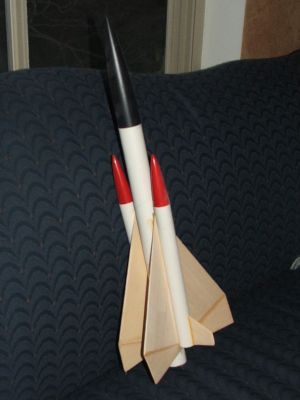
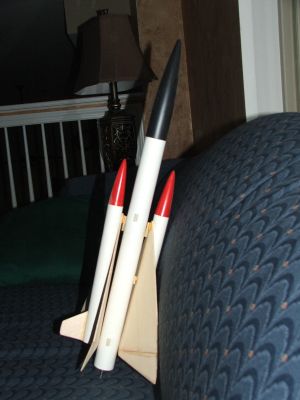
Construction:
The Parts list:
- 2 PNC-50 nose cones (Apogee Components)
- PNC-56 (Estes)
- 18mm engine mount kit
- 18" parachute kit
- 36" length of 1/4" sewing elastic for shock cord
- medium snap swivel
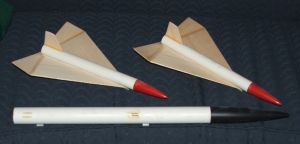
With no actual fins to attach, the booster section for this bird could scarcely be easier. I used wood glue to attach two sections of launch lug on opposite sides of the booster instead of going with the attachment method detailed in the plans. Two balsa scraps were then glued to each side to keep the rear of the gliders from simply hanging out in the wind. (They still hung out in the wind, they just had bumpers to keep them somewhat in line as they sat on the pad.)
The gliders were built as straight upscales of the original pattern. I had bought a nose cone assortment from Apogee Components and included were two matching red BT-50 cones, which seemed light enough to me. They were perfect.
Finishing:
I was trying to keep the weight down on this one, so I never bothered with finishing. Good thing. After the first two
flights it looked like it had been dragged to the launch behind a pickup truck.
Flight and Recovery:
First flight was at a local soccer field where I spent a lot of time back in 2001. I was a little hesitant about the
ability of the whole rocket to hold together under the stress of boost, so instead of going whole hog with a C6-3, I
went with what I thought was a somewhat less powerful engine, the C5-3. (You can see where this is going, can't ya?)
Well, I was right. At boost everything came apart. The booster left the rod and began flipping wildly, disengaging both
gliders and crashing to the ground under power. Despite the mess, there was good news, as both gliders floated serenely
across the field, light as a feather and under complete control.
Post-mortem showed that the launch lugs that held the gliders in place had pulled free from the booster body tube, rendering the booster unstable. I'd obviously not built the thing strong enough, so I decided to re-glue everything with epoxy then try again (heavy sigh) with another C5-3. As you may have guessed, the second flight didn't turn out any better than the first, and the remains of the project were banished to a far-off corner of my facility, never to see the light of day again.
Well, except for the gliders. I used them for a while as replacement gliders on my upscaled Condor. (The Condor glider had crashed into a Porta-Pottie then was stepped on by the occupant as he exited, although that wasn't his story.)
Almost five years passed and my motor savvy grew. (Or was finally born.) The booster for the Space Twins turned up again and the PNC-56 was almost adopted for use on another project, but then I thought to check the flight logs for the first two "flights". I'd made the C5-3 mistake on several other occasions (the Mach 10 comes to mind,) but never with such horrid results. I began to wonder if the whole Space Twins project might have been different with a more sedate B4-2 or B6-2 instead of the Godzilla C5-3. Since the whole thing was still in one piece, trying it again was just a matter of carting it up to the VOA and announcing that it was a "heads up" flight. On a warm day in May of 2006, I did just that.
The third flight was just as I'd hoped the first flight would be. The B4-2 boost was gentle enough to allow lift-off without ripping the gliders from their mounts, and the gently curving flight path made for a nice photo op. At ejection only one of the gliders disengaged and went sailing across the field in a northwesterly heading. I gathered up the booster and second glider, then began walking in the direction where I'd seen the glider land. I walked across that field in an ever widening search pattern for 45 minutes but never again saw the missing glider. (Even with the bright red cone that I thought would be a dead giveaway.) I was disappointed but not as badly as I would have been had the last flight been a copy of the first two. At least I proved to myself that the idea was viable, if not unlucky.
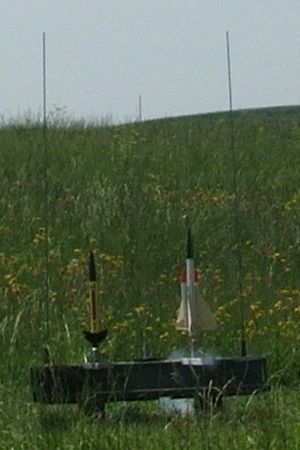
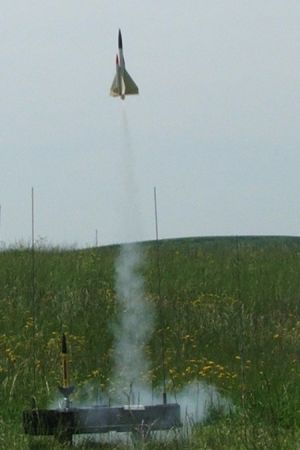
Summary:
PROs: Apogee nose cones worked great, as did the whole project once I figured the motor thing out.
CONs: I think I needed a motor tutor.
 |
 |